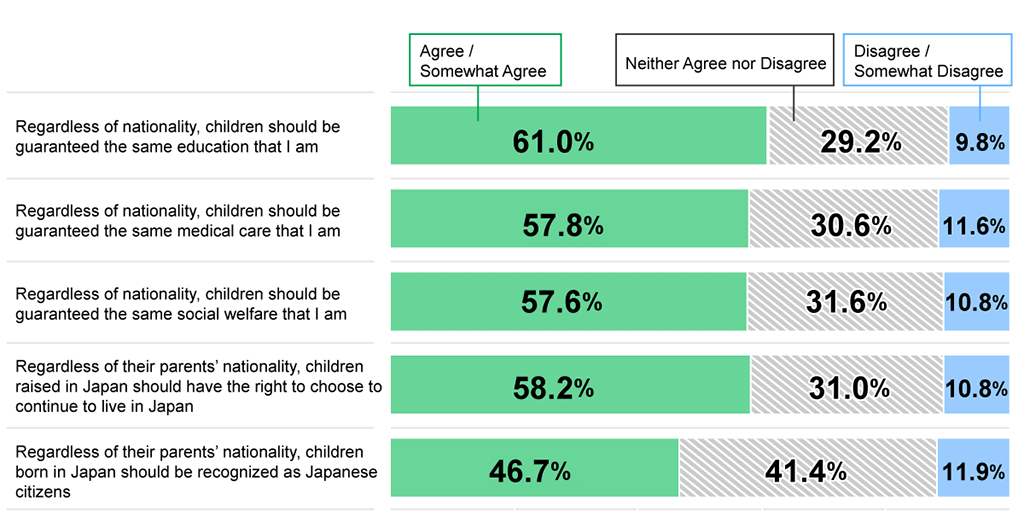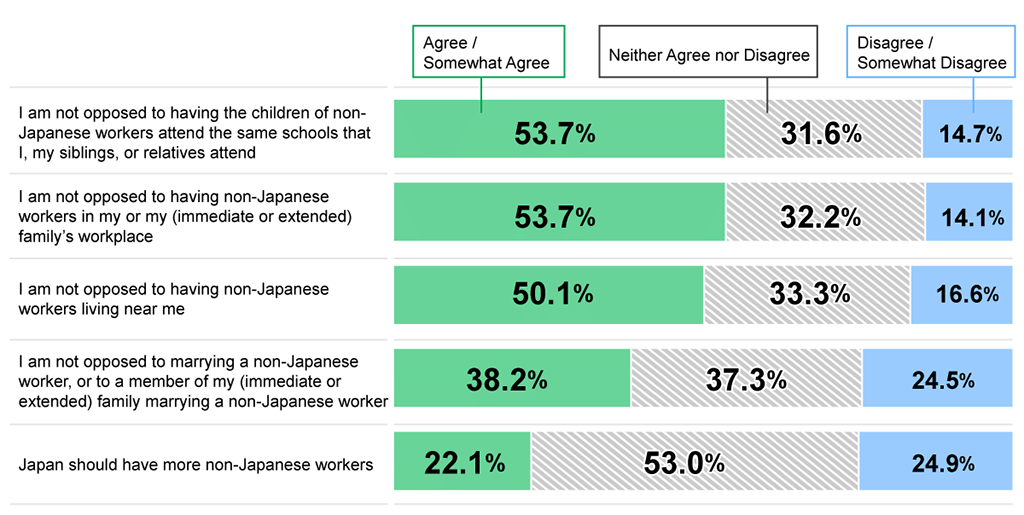Awareness Survey of 18-Year-Olds – International and Multicultural CoexistenceResults of 43rd installment announced
The 43rd installment of the Awareness Survey of 18-Year-Olds, launched by The Nippon Foundation in October 2018, was carried out from November 12 to 16 on the subject of “International and Multicultural Coexistence.” The survey was intended to examine young people’s interest in countries other than Japan, and their perception of non-Japanese persons including children living in Japan.
The survey found that while 41% of respondents were interested in studying abroad,1 of those respondents 32% said that their interest had diminished as a result of the coronavirus pandemic, clearly showing that the pandemic has had a negative effect on young people’s desire to be internationally engaged. Specifically, only 7% of respondents had studied abroad or had plans or hoped to study abroad, suggesting that young people’s interest needs to be encouraged. The survey also showed that young people are experiencing a diverse environment during their years of compulsory education, with between 21% and 33% replying that there were children with non-Japanese backgrounds2 in their class or grade during elementary or junior high school. This was reflected in roughly 60% of respondents replying that the same education, health care, and social welfare available to which they had access should be provided to these children regardless of nationality, far surpassing the roughly 10% who disagreed. In particular, those who had studied or were interested in studying abroad showed a higher tendency to respond affirmatively, suggesting a close correlation between having experienced or being interested in international exchange and receptiveness toward diversity.
Notes:
- For the purposes of this survey, “Interested in studying abroad” indicates the aggregate of those respondents who have studied abroad (3.3%), intend to study abroad (0.8%), would like to study abroad (2.9%), are interested in studying abroad (25.5%), and had been interested but are no longer interested in studying abroad (8.2%).
- For the purposes of this survey, “Children with non-Japanese backgrounds” refers to children under the age of 18 who have one or both parents whose nationality is not Japanese.
- For the purposes of this survey, “Non-Japanese workers” refers to persons working in Japan who are not Japanese citizens, including technical trainees, regular full-time employees, irregular and part-time employees, and self-employed persons.
- From the 13th survey, the number of respondents, comprising men and women aged 17 to 19, has been increased to 1,000 from 800. (With the exception of the 20th installment, “Awareness Survey of Society and Country,” all surveys cover respondents in Japan only.)
- In the information below, differences between total amounts and simple sums are due to rounding.
Survey 43. International and Multicultural Coexistence (Results announced on December 21, 2021)
Finding: 31.7% of respondents interested in studying abroad at least temporarily became less interested in or had less desire to study abroad following the outbreak of the coronavirus pandemic. (n = 407)
“Compared with before January 2020, has your interest in studying or desire to study abroad changed since the first reports of the coronavirus began emerging in January 2020?”

Finding: A majority of respondents believe children should have the same access to social services that they have, regardless of nationality, and the right to continue to live in Japan, regardless of their parents’ nationality. (n = 1,000)

Finding: A majority of respondents were not opposed to having the children of non-Japanese workers3 in their or their families’ schools, or to having non-Japanese workers in their workplace or community. (n = 1,000)

Other Findings
Positive aspects of Japan having more non-Japanese workers
- Offset the contraction of the labor force – 38.6%
- Invigorate society and the economy – 36.2%
- Give Japanese people a more cosmopolitan way of thinking – 35.1%
- Make culture more diverse – 34.7%
- Offset the declining birthrate and aging population – 29.1%
Negative aspects of Japan having more non-Japanese workers
- Adversely affect local public safety – 23.4%
- Take jobs from Japanese people – 22.8%
- Increase social security costs – 19.4%
- Adversely affect Japanese culture – 16.3%
- Increase education costs – 15.1%
Contact
Public Relations Team
The Nippon Foundation
- Email: cc@ps.nippon-foundation.or.jp



